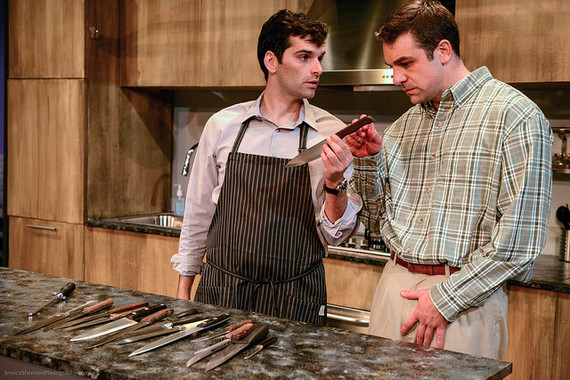Benjamin Brand's play, based on the 2001 incident in Germany in which a man agreed to be killed and eaten by another man (dubbed the Rotenberg Cannibal) has been justifiably praised for impeccable performances by Donal Thoms-Cappello and Chris L. McKenna, as well as for the audacious tackling of the subject matter by Brand.
The playwright imagines a meeting between the two men -- this time set in America -- and their slow dance toward murder and cannibalism. The production, skillfully directed by Stuart Gordon, plays up the suspense as knives are carefully laid upon the kitchen counter in anticipation of the coming gore-fest.
While Brand probes the motivations of each of the men -- which swing from perverse sexual pleasure to the desire for friendship between two lonely and alienated souls -- he never is able to really explain what exactly is going on here. This may be the point, after all, since this bargain is so far out of the realm of normal human experience that it could never be precisely understood.
The premise alone carries immense shock value -- as witness the numerous renditions of the Rotenberg Cannibal in movies, television and music. And the ritualistic power of the event translates well onto the stage. However, Brand's script focuses more on the horror of the event, and never really captures the darker implications of this monstrous act. Thoms-Cappello and McKenna are left to explore the darker depths in the performances, which they do exquisitely.
Still, one is left mostly with questions rather than answers. What is the meaning of this story? Brand tries to associate it with the desire for profound friendship, but this feels like a facile explanation. He seems to shy away from the primal sexual perversity at work here, although he does tantalize with the notion of a quest for the "hyper-real" in a world of virtual reality. So apart from the horror-show appeal of the play, we are left wondering "What was that about?"

